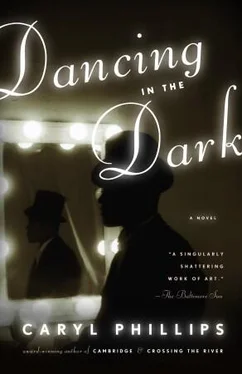Lottie does not know whether to talk to him about her hair. The fact is she does not talk to anybody about her hair. She simply hopes that nobody will notice. It is her own private misery, and she is seldom without a small hat. Mr. Thompson always chided her about this, and she promised him that she would try to be less self-conscious, but this has not proved possible. When she was a child, the hot iron and grease that her grandmother applied to her scalp produced little change beyond burning her so badly that she felt as though her whole head was a flaming ball of fire. In the years that have followed her hair has remained kinky and knotted and, worst of all, short. As she grew into womanhood she toyed with the idea of a wig, but unable to face the drama of moving between the wig and her natural state, she decided instead to mask the deficiency with a pretty hat. Mr. Thompson used to complain about her wearing a hat indoors, which served only to increase her disquiet, but then he fell silent, which made her feel as though there was tacit approval for her covering up her head. When Mr. Thompson stopped touching her she blamed her hair. She begged her hair stylist to find some treatment that would save her marriage, and together they began purposefully to work through all the products on the shelves, but to no avail. And then Mr. Sam Thompson died in Chicago, and Lottie relocated to New York and sought refuge in her less than noteworthy stage career, but the sad failure of her hair seemed to perfectly mirror the bleakness of her life until she accompanied Ada to the photographer’s studio where her friend had an appointment to pose for a tobacco company. Sadly, of late, her hair has stopped growing altogether, and the awkwardly sprouting two-inch tufts have become increasingly precious for she now fears their disappearance. Onstage she makes sure that her costumes always call for a bonnet, and this enables her to dance and sing without feeling excessively awkward. However, once she returns to the shared dressing room, she keeps her bonnet tightly fastened to her head and quickly removes her makeup. Having done this she picks up her hat and excuses herself, and only when she is safely secreted in the privacy of the bathroom does she exchange the bonnet for the hat before making her way back to the dressing room, where she knows that eyes are upon her for there is nothing subtle about her transformation. Now that she has remarried the problem of her hair is beginning once again to dominate her mind, so much so that shortly after her wedding she found the courage to ask Ada if she knew of anything that she might do to rectify the situation. While Ada expressed sympathy, she made it clear that if the products that Mrs. McDonald gave her to use on her own hair had no effect on Lottie’s, then she was at a loss to know what else to suggest. An embarrassed Lottie lowered her eyes. Clearly Ada had no idea of what it had cost her to confess to this problem, and having done so Lottie felt humiliated.
She blames her grandmother. After all it was she who, after her mother died giving birth to her younger sister, raised the pair of them as her own with the authority of the Lord as the stick to beat them with. From the age of three, when Lottie passed into her grandmother’s care, Saturday afternoons were given over to the straightening iron for the following day involved church. And so began the weekly ritual in which a terrified Lottie would be forced to submit to the agony of her grandmother’s attempts to tame her kinky head. Everything was about appearances, and her grandmother made it clear that no kin of hers was going to look like they should be walking barefoot. When her sister was less than two years old, she too was introduced to the ritual, but Florence’s hair took nice and easy, which only made her grandmother all the more determined to conquer Lottie’s head. Florence had “good” hair that flowed out to her shoulders, and inch by inch, her grandmother teased it down her younger sister’s back. However, despite years of this tugging and pulling and rubbing and creaming, her own hair remained stubbornly short and knotted. Of course, her resentment of the Saturday afternoon ritual meant that Lottie never truly engaged with the Lord’s day, although she could not admit to this. However, what caused her the most sorrow was the fact that over time a chasm grew between herself and Florence. While she could never bring herself to blame her sister for the death of their mother in childbirth, she took exception to the manner in which Florence flaunted her tresses and silently mocked her less fortunate older sister. Their grandmother seemed to delight in reminding them both that Florence resembled their father, with the same light blue eyes and “good” hair, but neither of them knew whether this was true or not for neither sister had ever set eyes on the man. They knew (but how they knew they were not sure) that he was a tall, good-looking gambling man from across the river who worked the boats, often going down as far as New Orleans in search of his thrills, and they had also heard the persistent rumors that he had once killed a man. But over the years the gulf between the two sisters grew wide and they seldom spoke about their father, or their mother, or about anything that mattered. As a young girl Lottie sang and danced, which was her way of hiding her wounded self, while Florence simply stood still but seemed pleased with herself that she seemed to be attracting the attention of strutting older boys. Hardly a week passed by without their anxious grandmother taking Florence to one side and chiding her for her wanton behavior, but soon little else seemed to matter to Flo, not church, not her big sister, and certainly nothing that the ailing old woman might say to her. When their grandmother finally died, leaving the two teenage girls alone with nobody to look out for them, Lottie tried to play both mother and grandmother but it was too late. Florence, her hair now down to her waist, had grown as wild as her grandmother had feared, and fasttalking Teddy Washington had already entered her life with his gun-toting, mannish ways. He had long been determined to make young Flo his woman , and within a month of their grandmother’s funeral the child in Flo’s thirteen-year-old belly suggested that Mr. Washington had already succeeded. A year later Lottie took off for Chicago, and a life on the stage, but by then her sister was already carrying her second child and looking ten years older than her true age. Lottie found decent lodgings in Chicago, and a job in a show that presented colored people in a respectable light. She also found a woman who was prepared to take on the challenge of her hair, but after eagerly accepting a great deal of Lottie’s money, this woman was ultimately forced to admit defeat. However, some men still found Lottie attractive company and sought her out, but the young dancer was not in any hurry to find herself attached to a husband. She finally kindled an affection for the Lord, and the church became her constant companion until Mr. Sam Thompson began to appear at the theater each evening. After every performance he made a habit of waiting for her by the stage door, but not with plaintive, hopeful eyes like the other men who loitered in the narrow alleyway. This man waited with a silver-topped cane in his gloved hand, and a chin held high, and eyes clear and bright, and a voice so deep it sounded like a train rumbling by.
Eventually Florence had three children, all girls, and all by Mr. Washington, but before the third child declared itself, her beau disappeared and she had no idea if he would ever return to her. To begin with she asked around, venturing into drinking dens that she knew he used, and although she was clearly big with Mr. Washington’s child this did not deter wet-lipped men from sidling up to her and offering to make her and her children comfortable. And then it struck her: Teddy Washington must be either dead or in prison for nobody would dare talk to Teddy Washington’s girl in this manner if there was even the slightest possibility of his returning. A desperate Florence needed money to put food on the table to feed her two children, plus the one in her belly, but she could not bring herself to write to Lottie, who she heard had just married some swanky colored businessman in Chicago. And so Florence went back to Willie’s Foxtrap and asked a balding, thickset nigger sport named Duke the same question that she had asked him the week before, but the man had still not seen or heard from Teddy Washington. This time Florence sighed and looked Duke up and down for she understood that whether she liked it or not she would need the protection of a man, good or bad, if she was going to get through this life. And so, after the birth of Teddy Washington’s third child, Duke started to pay her manly attention, running his fingers through her long black hair, and whispering in her ear, and then he too walked clear out of her life, for high-pitched wailing from another man’s offspring was not something that he had bargained for. But other men did not seem to mind. They left crumpled bills on the side table before they hit the door and disappeared back onto the streets leaving Flo to endure the resentful eyes of her children, who by now were becoming familiar with the uncomfortable weight of the word “company.”
Читать дальше












